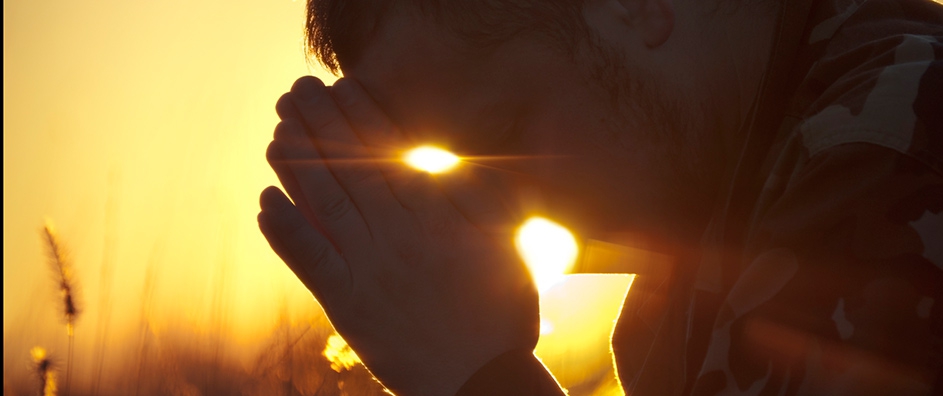The views expressed in our content reflect individual perspectives and do not represent the authoritative views of the Baha'i Faith.
Universally, people pray. Native people express gratitude for life’s bounties by calling out to Wakantanka, the Great Mystery. Chanting and meditation rituals honor the Brahman in Hindu daily life. Muslims perform ablutions (washing) before reciting prayers. Tibetan Buddhists spin the prayer wheel on which sacred mantras appear, so the Deities will read the words even when the devotees remain illiterate.
In the U.S., more than half of those surveyed in 2015 said they pray every day. A full 82% of Americans who pray do so to solicit help for loved ones—but sometimes for dubious purposes such as fulfilling that wish for the last parking spot, the winning lottery ticket, or even to tip the odds that the boss will fire an unlikeable co-worker. Not every prayer comes from a positive motivation, according to the Pew Research Center’s survey.
The Jewish root word for prayer means to come to terms with God through introspection and confession. Just how introspectively do we pray today? When we feel concern about the results prayer brings, or about our wandering mind during the process of prayer, we might consider brushing up on our own dialect—the way we pray.
Whatever our tradition, we learn to speak the language of deep prayer by quieting our left-brain chatter and listening. We may not master it as effortlessly as we learn our native tongue. We must practice deep listening skills again and again, with every prayer over a lifetime.
Abdu’l-Baha, the role model for Baha’is, traveled to New York early in the 20th century. One day he invited an eager follower to his quarters to teach the man to pray. His guest arrived at 6:00 a.m. and found Abdu’l-Baha deep in prayer at his bedside. He knelt opposite Abdu’l-Baha and began to pray. He ticked off every priority on his prayer list, then he became distracted by cracks in the wall, birds outside, and his aching back. After two hours, he finally gazed at Abdu’l-Baha’s face and saw it shining with the radiance of deep communion with the divine. He suddenly longed for a prayer “beyond the murmur of syllables and sounds” as the Baha’i prayers describe this state. He longed to feel the sense of devotion he had witnessed. He received an immediate answer to his request, and enjoyed a few moments of exquisite prayer, grateful for this sweet lesson on “how to pray.”
Many people—83%, according to a 2012 poll—have experienced powerful answers to prayer. How often do we linger for the extended goal, the transcendent moments of ecstasy that brings us closer to the divine and fortifies us for the tests we might face throughout the day?
 I grew up with prayer. I secretly watched my father pray at dawn, the tears streaming down his face. I found my own reverie on creek banks and in forest hollows, talking to God whenever I had a moment free of chores or music practice or field labor as a child. Many years later, disenfranchised by the theology of my faith and living far from civilization, I left organized religion for five years. Still, I learned that when I felt a deep need, God rushed to my side. The power of prayer seemed incontrovertible. At a time when I was farthest from a faith community, I tearfully prayed one night for help earning enough money to feed my children. This temporal need met with divine compassion. I awoke the next morning to the sound of a ringing phone. I stepped on a twenty dollar bill that wasn’t there the night before. On the phone, someone offered me a second job that helped pay the bills my day job couldn’t cover.
I grew up with prayer. I secretly watched my father pray at dawn, the tears streaming down his face. I found my own reverie on creek banks and in forest hollows, talking to God whenever I had a moment free of chores or music practice or field labor as a child. Many years later, disenfranchised by the theology of my faith and living far from civilization, I left organized religion for five years. Still, I learned that when I felt a deep need, God rushed to my side. The power of prayer seemed incontrovertible. At a time when I was farthest from a faith community, I tearfully prayed one night for help earning enough money to feed my children. This temporal need met with divine compassion. I awoke the next morning to the sound of a ringing phone. I stepped on a twenty dollar bill that wasn’t there the night before. On the phone, someone offered me a second job that helped pay the bills my day job couldn’t cover.
A few years later, I discovered the Baha’i Faith, a religion that held all the beliefs I already cherished in my heart and had already begun teaching my children. When I first heard the poetic, inspired prayers revealed by the Faith’s founder and his son, I trembled with joy. I had always been taught that prayer must come from the heart, not the written page. However, now I could see the power of first preparing the heart to speak by reading these sacred passages. At last the personal appeals, the time spent in meditation, the communion with nature—indeed all the modes of prayer—could flow into my waiting soul with purity and ease on the foundation laid by these beautiful Baha’i prayers. Material concerns seemed almost unworthy of prayer now. The words of the prayers brimmed with so much more.
Some of the finest prayers soften the spirit for the process of listening, as in this passage from Baha’u’llah:
…If it be Thy pleasure, make me to grow as a tender herb in the meadows of Thy grace, that the gentle winds of Thy will may stir me up and bend me into conformity with Thy pleasure, in such wise that my movement and my stillness may be wholly directed by Thee… – Prayers and Meditations, p. 240.
Others, such as the following passage from Abdu’l-Baha, ennoble the soul. The phrases seem designed to align our thoughts with pure motivations and direct us toward a spiritual purpose, sure as a compass, pointing our personal prayers toward the needs of others:
Make my heart overflow with love for thy creatures and grant that I may become the sign of Thy mercy, the token of Thy grace, the promotor of concord amongst Thy loved ones, devoted unto Thee, uttering Thy commemoration and forgetful of self but every mindful of what is Thine… – Baha’i Prayers, p. 30.
Prayers that moved me years ago now take on new layers of meaning, but I always recall my finest hours, then and now, as the hours spent in prayer. May the passages above inspire you, as you seek the serenity and guidance that distill on the listening heart in moments of purposeful prayer.
















Comments
Sign in or create an account
Continue with Googleor